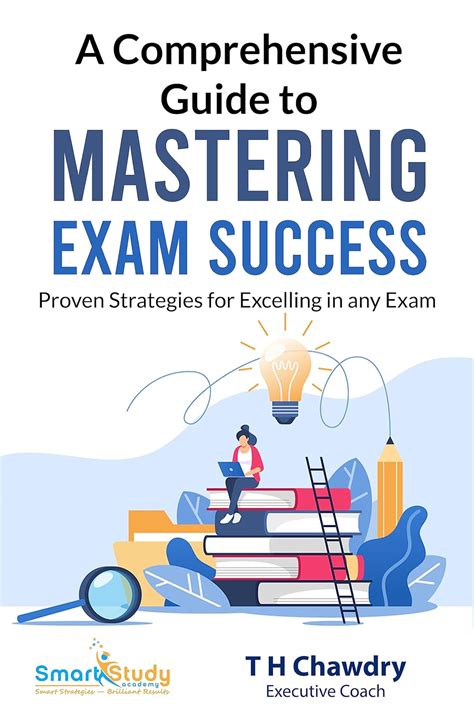Education assessments play a pivotal role in evaluating a student's knowledge and understanding of a particular subject. Securing remarkable marks requires a combination of effective study techniques, strategic planning, and smart exam-taking strategies. By incorporating these helpful pointers, individuals can maximize their potential and excel in their academic pursuits.
1. Embrace Active Learning: Instead of passive reading or memorization, adopt an active approach towards learning. Engage actively with the study material by highlighting key concepts, taking concise notes, and discussing ideas with peers. This dynamic involvement enhances comprehension, making it easier to recall information during exams.
2. Foster Effective Time Management: Developing strong time management skills is crucial for exam success. Prioritize tasks, create a study schedule, and allocate dedicated time periods for each subject. Efficiently managing time ensures adequate revision, thereby reducing anxiety and boosting confidence.
3. Cultivate a Multifaceted Study Routine: Utilize various study techniques to cater to different learning styles. Experiment with visual aids, such as diagrams or flowcharts, to enhance understanding. Additionally, engage in group discussions to gain diverse perspectives and reinforce knowledge through social learning.
4. Harness the Power of Practice: Regular practice tests not only help identify strengths and weaknesses but also build familiarity with the exam format. Take advantage of past papers, sample questions, and online resources to simulate the exam environment. Practice reinforces essential concepts and allows for effective time management during the actual examination.
5. Nurture a Healthy Balance: Maintaining a balanced lifestyle is essential for optimal performance. Ensure sufficient rest, exercise, and a well-balanced diet to keep the mind and body rejuvenated. Remember, a healthy body supports a healthy mind, enabling better focus and concentration during exams.
By integrating these strategies into one's study routine, students can improve their chances of achieving exceptional exam results. Remember, every individual has their unique approach to studying, so adapt these tips to suit personal preferences and learning styles. With dedication, discipline, and a positive mindset, academic success is within reach!
Strategies for Excelling in Exams

Enhancing your performance in exams requires effective planning and comprehensive preparation. Below are some valuable insights to help you excel in your upcoming tests.
- Develop a systematic study schedule: Organize your study sessions and allocate specific time slots for each subject. This structured approach will enable you to cover all the necessary material without feeling overwhelmed.
- Set clear goals: Define specific goals for each study session and exam. Having a clear objective in mind will keep you motivated and focused throughout the preparation process.
- Practice active learning: Instead of passively reading the material, engage in active learning techniques such as summarizing key points, creating flashcards, or teaching someone else the content. This will enhance your understanding and retention of the material.
- Review and revise regularly: Regular revision is crucial for reinforcing your knowledge and identifying areas that need further attention. Set aside dedicated time to review the material you have already covered.
- Seek help when needed: Don't hesitate to reach out to your teachers or classmates if you're struggling with certain topics. Collaborative learning and clarifying doubts will strengthen your understanding and boost your confidence.
- Utilize past papers and sample questions: Practice previous exam papers and sample questions to familiarize yourself with the format and types of questions. This will help you become more comfortable with the exam structure and improve your time management skills.
- Manage your time effectively: Develop time management strategies by allocating appropriate time to each question or section during the exam. This will prevent you from spending too much time on a single question and ensure that you can attempt all questions within the given timeframe.
- Take care of yourself: Prioritize self-care during the exam preparation period. Get sufficient sleep, eat balanced meals, and exercise regularly to keep your mind and body in optimal condition.
By implementing these strategies, you can enhance your exam performance and achieve the results you desire! Remember, consistent effort and a positive mindset are key to excelling in exams.
Effective Study Techniques
Enhancing your academic performance requires the implementation of effective study techniques. These strategies help you maximize your learning potential and improve your comprehension and retention of the subject matter. By adopting these methods, you can optimize your study time and achieve remarkable results in your exams.
| 1. Active Learning | Engage actively with the material by taking notes, summarizing key concepts, and asking questions. Actively participating in your learning process enhances understanding and promotes effective recall during exams. |
| 2. Effective Time Management | Plan your study sessions in advance and allocate specific time slots for each subject. Set realistic goals, prioritize tasks, and avoid procrastination to ensure efficient use of your study time. |
| 3. Utilize Varied Study Techniques | Experiment with different study methods, such as reading aloud, creating concept maps, and teaching the material to someone else. Find the techniques that work best for you and incorporate them into your study routine. |
| 4. Practice Regularly | Consistent practice is key to mastering any subject. Solve practice questions, attempt past exam papers, and participate in study groups or discussions to reinforce your understanding and boost your confidence. |
| 5. Create a Distraction-Free Environment | Eliminate distractions, such as electronic devices and noisy surroundings, to maintain focus and promote concentration. Find a quiet and comfortable space where you can fully immerse yourself in your study materials. |
Implementing these effective study techniques into your study routine will significantly enhance your chances of achieving outstanding exam results. Remember, studying smart is just as important as studying hard, and with the right strategies in place, you can excel in your academic endeavors.
Effective Strategies for Managing Your Time Efficiently

When it comes to optimizing your use of time, there are several key strategies that can help you stay organized and focused. By implementing effective time management techniques, you can increase your productivity and maximize your chances of achieving excellent results in your exams.
1. Prioritize wisely:
- Create a to-do list and rank tasks based on their importance and urgency.
- Focus on completing high-priority tasks first to ensure that you tackle the most important assignments or studying material.
- Break down larger tasks into smaller, manageable chunks to make them more achievable.
2. Set specific goals:
- Clearly define what you want to accomplish within a given time frame.
- Create a study schedule or a timetable to help you allocate your time effectively.
- Set realistic deadlines and strive to meet them to stay on track.
3. Minimize distractions:
- Avoid multitasking, as it can lead to decreased efficiency and lower quality work.
- Turn off notifications on your electronic devices and designate specific times for checking emails or messages.
- Find a quiet and comfortable study environment where you can focus without disruptions.
4. Take regular breaks:
- Allow yourself short breaks during study sessions to prevent burnout and maintain concentration.
- Incorporate physical activity or relaxation techniques into your breaks to refresh your mind and body.
- Avoid long periods of continuous studying, as they can lead to diminishing returns.
5. Use effective study techniques:
- Utilize active learning methods, such as summarizing information or teaching material to someone else.
- Practice regular self-assessment through quizzes or practice exams to gauge your understanding and identify areas for improvement.
- Organize study materials in a logical and systematic way to make review sessions more efficient.
By implementing these effective time management strategies, you can enhance your ability to prioritize tasks, stay focused, and make the most of your study time. Remember, achieving excellent exam results requires not only knowledge and understanding but also the skill to manage your time effectively.
Key Strategies for Exceptional Performance in Examinations
Acquiring remarkable results in exams requires a comprehensive approach that goes beyond mere studying and preparation. To achieve outstanding performance, students should implement key strategies that encompass effective time management, efficient study techniques, effective revision methods, and the cultivation of a positive mindset.
One crucial aspect of optimizing exam performance is efficient time management. Allocating sufficient time for studying, revision, and relaxation helps create a balanced routine and reduces the likelihood of burnout. Additionally, it is essential to set realistic study goals and create a study schedule that allows for consistent progress and sufficient breaks for rejuvenation.
Another critical strategy is to employ effective study techniques that enhance understanding and retention of the subject matter. Implementing active learning methods such as summarizing key concepts, creating flashcards, or engaging in group discussions can significantly improve knowledge absorption and comprehension. Additionally, utilizing visual aids such as diagrams, charts, and graphs can aid in reinforcing understanding and information recall.
When it comes to revision, adopting effective methods is paramount. The use of spaced repetition techniques, where material is reviewed periodically over a longer period, can boost long-term memory retention. Furthermore, practicing past exams or sample questions allows students to familiarize themselves with the format and types of questions typically asked, enhancing their preparedness for the actual examination.
A positive mindset plays a fundamental role in achieving exceptional exam performance. A confident attitude and belief in one's abilities enhance motivation and reduce anxiety. Students should cultivate self-belief, practice positive self-talk, and visualize success to boost their confidence levels. Additionally, maintaining a healthy lifestyle by getting adequate sleep, exercising regularly, and nourishing the body with nutritious food can significantly impact cognitive function and overall performance.
In conclusion, attaining outstanding results in exams requires a holistic approach that incorporates effective time management, efficient study techniques, productive revision methods, and fostering a positive mindset. By implementing these key strategies and tailoring them to individual needs, students can maximize their potential and achieve exceptional performance in their examinations.
FAQ
What are some strategies for studying effectively?
There are several strategies that can help improve studying effectiveness. Firstly, it is important to stay organized and create a study schedule. Secondly, it is recommended to break up study sessions into smaller, manageable chunks. Additionally, finding a quiet and comfortable place to study can minimize distractions. Finally, using active learning techniques such as summarizing information and teaching it to someone else can enhance understanding and retention.
How can I manage my time better while preparing for exams?
To manage time better during exam preparation, it is helpful to create a study plan and set specific goals for each study session. Prioritizing tasks based on their importance and difficulty can also aid in time management. Avoiding procrastination and staying focused on the task at hand is crucial. Moreover, taking short breaks every hour or so can actually improve productivity. Lastly, it is essential to maintain a healthy lifestyle by getting enough sleep, eating nutritious food, and exercising regularly.
What are some effective ways to overcome exam-related stress?
Dealing with exam-related stress requires a combination of physical and mental strategies. Firstly, engaging in relaxation techniques such as deep breathing, meditation, or listening to calming music can help reduce stress levels. Organizing study materials and breaking them down into manageable sections can also alleviate anxiety. Creating a positive study environment by eliminating distractions and surrounding oneself with motivational materials can have a positive impact. Seeking support from friends, family, or a study group can provide emotional assistance. Lastly, maintaining a healthy lifestyle by exercising regularly, getting enough sleep, and eating a balanced diet can contribute to better stress management.



